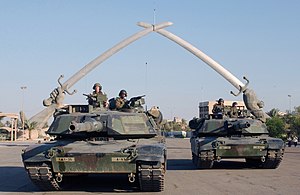2003 war in Iraq
| 2003 invasion of Iraq | |||||||
|---|---|---|---|---|---|---|---|
| Part of the Iraq War | |||||||
 U.S. Army M1A1 Abrams tanks and their crews pose for a photo in front of the "Victory Arch" monument at Baghdad's Ceremony Square in November 2003. |
|||||||
|
|||||||
| Belligerents | |||||||
|
Coalition forces: With military support from: |
|
||||||
| Commanders and leaders | |||||||
|
Ahmed Chalabi |
|
||||||
| Strength | |||||||
|
380,000 troops
|
Ansar al-Islam: 600–800 |
||||||
| Casualties and losses | |||||||
|
Coalition: 196+ killed |
Estimated Iraqi combatant fatalities: 30,000 (figure attributed to General Tommy Franks) 7,600–11,000 (4,895–6,370 observed and reported) (Project on Defense Alternatives study) 13,500–45,000 (extrapolated from fatality rates in units serving around Baghdad) Total: 7,600–45,000 killed |
||||||
|
Estimated Iraqi civilian fatalities: 392,979 to 942,636 excess Iraqi deaths by June 2006 (Lancet Report) 48,000 to 751,000 excess Iraqi deaths by June 2011 (University Collaborative Iraq Mortality Study) |
|||||||
Coalition victory
Coalition forces:![]() United States
United States![]() United Kingdom
United Kingdom![]() Australia
Australia![]() Poland
Poland
With military support from:
Iraqi National Congress![]() Peshmerga
Peshmerga
...
Wikipedia
